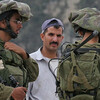
For years, Israeli authorities have both barred Palestinian access to rings of land surrounding settlements, and have not acted to eliminate settlers’ piratical closing of lands adjacent to settlements and blocking of Palestinian access to them. Blocking access is one of the many ways used to expand settlements. Read more about Israel denies Palestinians access to land around settlements

In the past year Israel has escalated its policy of separating the Palestinian populations of the Gaza Strip and West Bank from each other. The separation regime tears families apart, puts thousands at risk of expulsion to the Gaza Strip and turns Palestinians into “illegal aliens” in their own home. This policy is revealed in a position paper published today (Wednesday 10 September) by human rights organizations HaMoked and B’Tselem. Read more about Israel imposes more severe permit regime
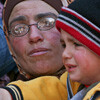
Since October 2007, Israel has approved 31,830 requests for family unification in the West Bank and Gaza Strip. This is the first exception in Israeli policy on this issue since September 2000, when Israel froze family unification procedures and the granting of visitor’s permits. The approvals, which were given in the framework of Israeli-Palestinian political negotiations, were described as a gesture, and not a change in policy. Read more about Israel's family unification gesture not a change in policy

My friend and I decided to go to Tel Aviv at night to visit a friend of ours who works at a hotel there, and hang out on the beach together. Just before we reached the hotel, I noticed a car behind us. The driver of the other car blinked his lights, and I saw it was a police car, a GMC with a siren. I pulled over to the curb and stopped. The car stopped next to me, and one of the people in it asked, “Where are you from?” Read more about Testimony: Israeli police severely beat Palestinian student in Tel Aviv
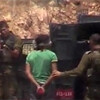
Today, B’Tselem is publishing a video clip documenting a soldier firing a rubber coated steel bullet, from extremely close range, at a cuffed and blindfolded Palestinian detainee. The shooting took place in the presence of a lieutenant colonel, who was holing the Palestinian’s arm when the shot was fired. Read more about Israeli soldier shoots restrained Palestinian at close range
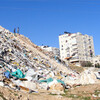
The Jerusalem Municipality’s gross, prolonged neglect of East Jerusalem has led to the Dahiyeh al-Salam neighborhood becoming a pirate garbage dump. The Municipality has not yet kept its promise to renovate the refuse site. Dahiyeh al-Salam is one of East Jerusalem’s most neglected areas. Read more about Occupier's neglect allows neighborhood to be used as dump
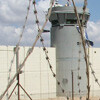
The separation barrier has not been moved in any of the sections that were built and later nullified by the Israeli high court. The human rights organization B’Tselem published this finding today, 9 July 2008, marking the fourth anniversary of the advisory opinion given by the International Court of Justice, in The Hague, which held that building the barrier in the West Bank breached international law. Read more about No section of the wall nullified by Israeli court dismantled
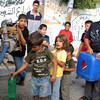
The chronic water shortage in the West Bank, resulting from an unfair distribution of water resources shared by the Palestinians and Israel, will be much graver this summer because of this year’s drought. In the northern West Bank, water consumption has fallen to one-third of the minimal amount needed. The 2008 drought, the most serious drought in the area in the past decade, aggravates the built-in, constant shortage of water in the West Bank. Read more about Israel's discriminatory water policies leave West Bank dry

On 28 April, Israel’s Jerusalem District Court sentenced border policeman Yanai Lazla to six years’ imprisonment for the killing, in 2002, of ‘Amran Abu Hamdiya, 18, from the West Bank town of Hebron. Lazla and three other policemen threw Abu Hamdiya from a jeep moving at high speed after they had abducted, beaten and abused him. His head struck the pavement with great force, killing him. Read more about Rare Israeli conviction in 2002 killing of Palestinian
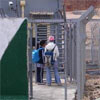
The village of Nu’man lies at the southeast edge of the Jerusalem Municipality, a few hundred meters north of Beit Sahour, a Palestinian town near Bethlehem. Northwest of Nu’man, in East Jerusalem, lie the villages of Umm Tuba and Sur Baher and the Har Homa settlement. Nu’man’s 170 residents live in almost total isolation from Jerusalem and the West Bank. Read more about Isolated by the wall: The case of Nu'man village









